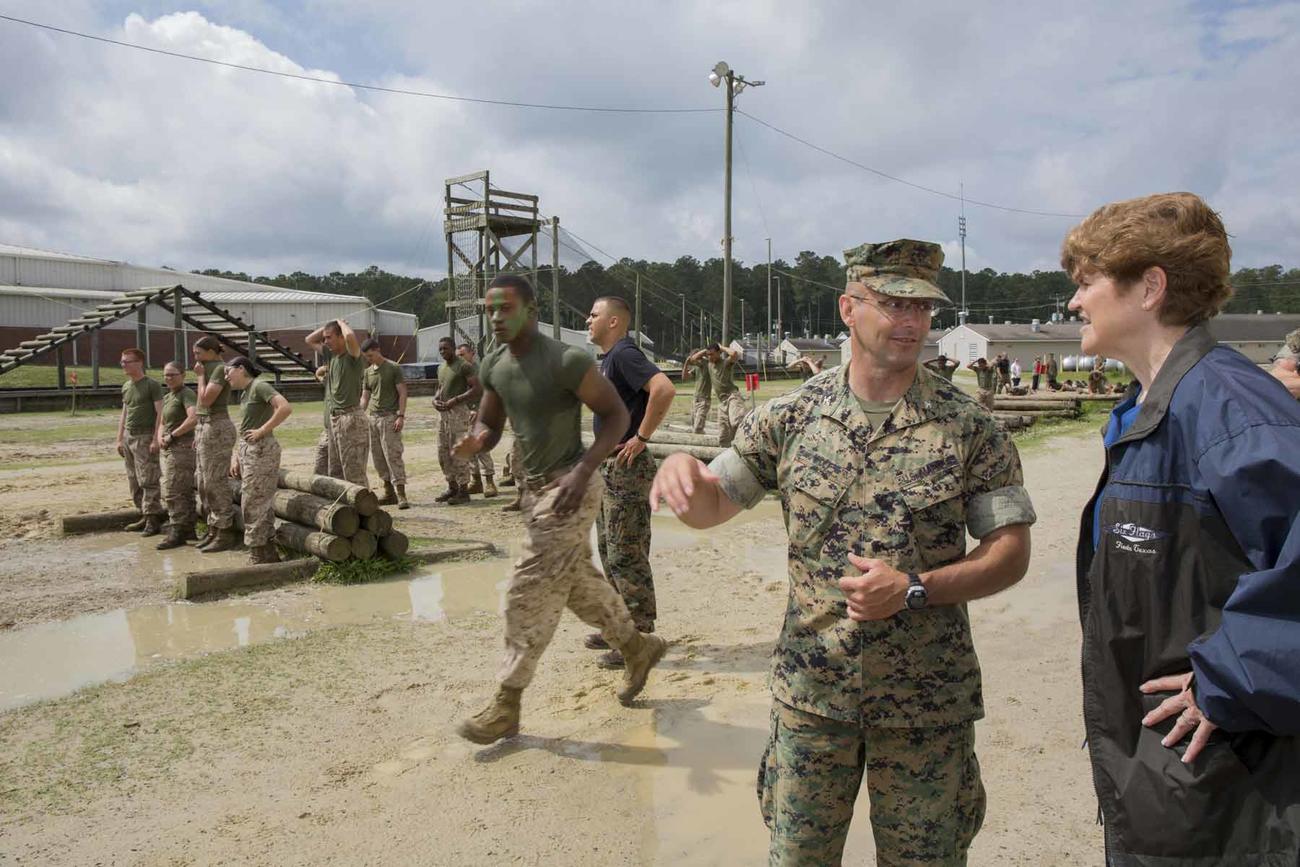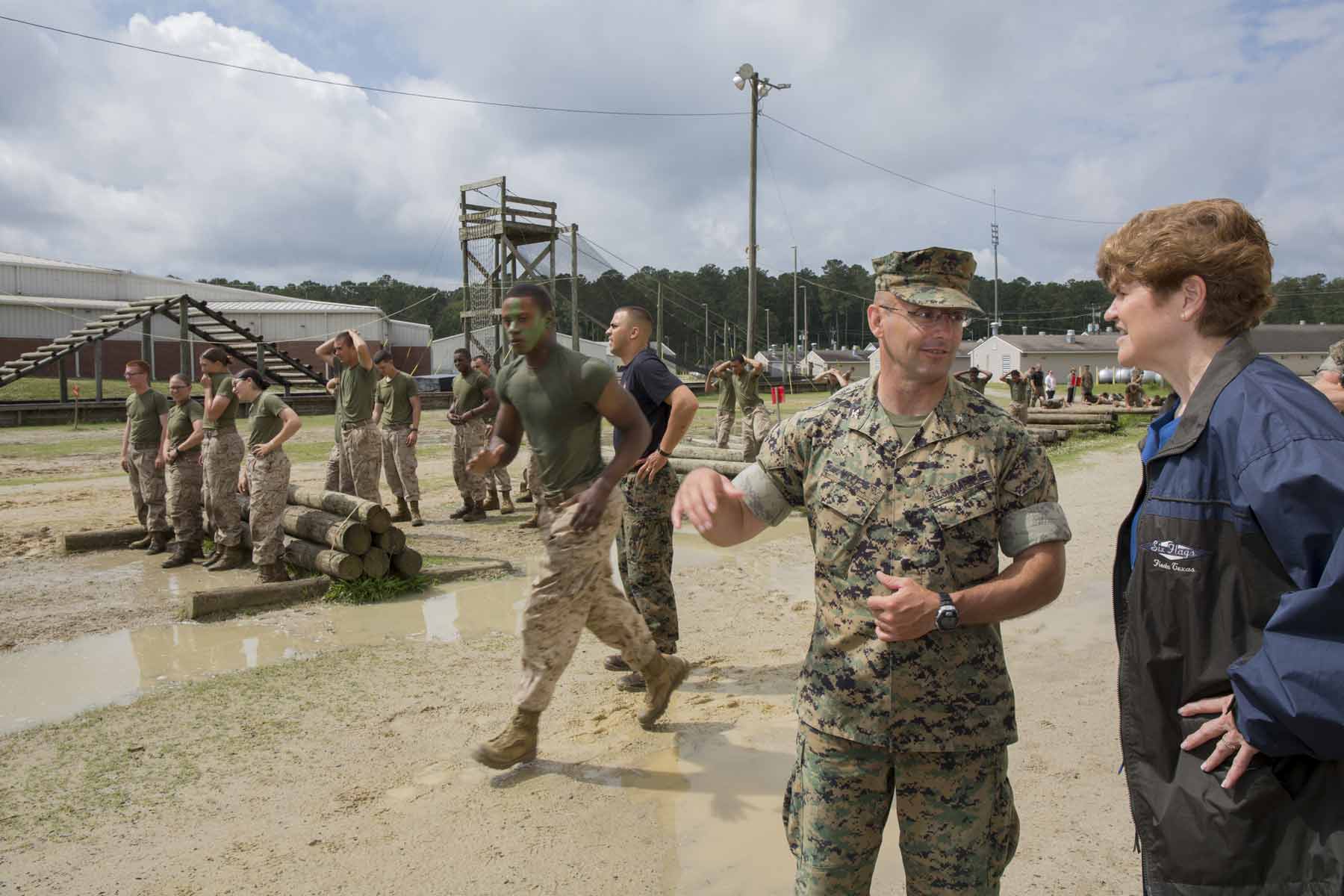

In January of this year, the Pentagon quietly demanded the resignations of the 21 volunteer members of the Defense Advisory Committee on Women in the Services, a roster that included eight retired generals and admirals. The ink was barely dry on the committee’s 70-year historical review, a 58-page document that described how DACOWITS had advocated on behalf of military women since 1951 on issues ranging from their right to fly fighter jets and serve in combat to the fit of body armor and online harassment.
The committee’s hollowing out was part of a sweeping move by Defense Secretary Lloyd Austin to dissolve all 42 DoD advisory committees pending a cost and efficiency review. The Defense Business Board, which had been populated with those loyal to Donald Trump in the final throes of his presidency, got the most attention in this move.
But DACOWITS, which had been wrestling with timely issues such as the effect on women of the new gender-neutral Army Combat Fitness Test, was an unseen casualty. While no decision has been made yet on how and when to bring back the vacated advisory committees, an April memo obtained by Military.com shows that the Defense Department’s Manpower and Reserve Affairs office has recommended not bringing back DACOWITS in its current form. Rather, it wants to merge the historic committee with another yet-to-be-launched group to create a broader Defense Advisory Committee on Diversity, Equity and Inclusion that would address everything from military extremism and opportunities for minority service members to ill-fitting uniforms and availability of child care.
Read Next: Beyond the Seized AK-47: The Real Story of the Forrest Sherman CO’s Downfall
But those affiliated with DACOWITS fear bundling such a wide range of issues under a single advisory entity would make it very difficult to get meaningful work done — and would shove women-specific military issues, such as hair regulations and anatomy-appropriate flight suits, far to the sidelines.
Cari Thomas, a retired rear admiral who was wrapping up a four-year term on the advisory committee, said she understood Austin’s desire to eliminate waste by conducting a zero-based review of the committees.
“However, I do have an issue, because DACOWITS has been around for a very long time and has been instrumental in advocating for women service members since the 1950s,” she said. “In a post-‘Me Too’ environment, working on [topics like] sexual assault, the timing did not feel right to me.”
Thomas wrote a letter in February to Sen. Tim Kaine, D-Va., urging him to act on behalf of the committee and preserve not only its format, but its institutional knowledge and expertise.
“Losing momentum, expertise and initiative will have a deleterious impact on the critical work that the Committee does in service to the Secretary of Defense and Homeland Security,” she wrote. “This is particularly important because the Marine Corps still does not have a fully gender integrated boot camp, the full opening of all combat positions to women is still under study, and women of color far lag behind their peers to promotions to the highest ranks in the services.”
A query to Kaine’s office did not receive an immediate response, but other lawmakers have signaled their interest and concern, despite the press of other priorities, including the fiscal 2022 budget.
The office of Rep. Jackie Speier, D-Calif., confirmed that she and the office’s military legislative assistant are looking into the matter. Sen. Kirsten Gillibrand, D-N.Y., told Military.com she hadn’t been tracking the matter, but didn’t have an issue with a new, merged committee as long as it serves the same function as the previous one.
The April 2022 memo from Acting Assistant Secretary of Defense for Manpower and Reserve Affairs Virginia Penrod said the proposed Defense Advisory Committee on Diversity, Equity and Inclusion would indeed be able to do that.
“There is concern that the merger of DACOWITS with [the yet-to-be-formed Defense Advisory Committee on Diversity and Inclusion] will diminish the [DoD’s] focus on, or signal a lessening in the Department’s commitment to addressing issues unique to women in the services,” Penrod wrote. “To the contrary, such a merger would offer the Department the opportunity to develop a broader over-arching committee with a more diversified skillset, providing for a holistic view of, not only issues related to women, but to all gender-related concerns including those faced by transgender members of the Armed Forces.”
Those close to DACOWITS, however, said it’s logistically improbable, if not impossible, that the merged committee would be able to cover all previous issues and new ones in appropriate depth. DACOWITS has a full-time staff of four, including two military members. Penrod’s proposal would add just two additional staff for the hybrid committee, which she said would realize a “significant cost avoidance” when compared with setting up two separate committees.
In the scheme of military spending, though, the savings would be relatively minimal. A memo to the Defense Department from DACOWITS staff showed a budget of roughly $1 million annually since 2016 — although that number dipped to $929,000 in 2020 amid the zero-based review. Committee members are uncompensated and reimbursed only for travel, which accounts for less than 10% of the budget. The rest largely consists of salaries for the staffers. If the two detailed military members’ salaries are subtracted from the annual total, it dips to around $600,000, barely a rounding error for the military.
Lory Manning, a retired Navy captain who now works as the director of government operations for the Service Women’s Action Network, said she has been attending quarterly DACOWITS meetings since the 1980s, when she was still on active duty.
She recalled an effort during the George W. Bush administration in 2004 to diminish the committee’s work by cutting its funding and reducing staffing and membership. Notably, this took place as the committee fought to eliminate the long-standing ban on women in combat. That Combat Exclusion Policy was ultimately lifted in full in 2013.
Manning said she feels similarly about efforts to denature DACOWITS now, albeit for other reasons. Manning said LGBT issues in the military and continuing racial and ethnic divides need to be addressed in full.
“Women are involved in all those communities,” she said. “My concern is if they merge it, as too often happens, the women’s issues will become secondary to other particular issues. There are still things going on that only DACOWITS has been able to bring to public attention.”
Thomas, the retired admiral, noted that the Marine Corps had started sending the four-star assistant commandant, Gen. Glenn Walters, to DACOWITS meetings following the Marines United scandal in which investigative reporting revealed veterans and service members were sharing nude photos of female troops online. She said that DACOWITS had provided detailed recommendations about better monitoring social media behavior before the scandal ever came to light.
“Without that kind of third-party group of independent people providing input to the secretary of defense, how are you going to make decisions?” she asked.
Manning listed an incident earlier this year in which Fox News host Tucker Carlson mocked an image of an airman wearing a maternity flight suit as proof that female troops still need advocates and defenders. And women in the military often have concerns that are overlooked, she said.
“Sexism is still alive and well in the military, and a lot of it is inadvertent,” she said. “I don’t think the military set out to build an Army Combat Fitness Test that was skewed against women. DACOWITS was one of the groups that called them out on that and called them in to brief. Until [the committee] was disbanded, they were still working on that.”
— Hope Hodge Seck can be reached at [email protected]. Follow her on Twitter at @HopeSeck.
Related: Nearly Half of Female Soldiers Still Failing New Army Fitness Test, While Males Pass Easily
© Copyright 2021 Military.com. All rights reserved. This material may not be published, broadcast, rewritten or redistributed.
